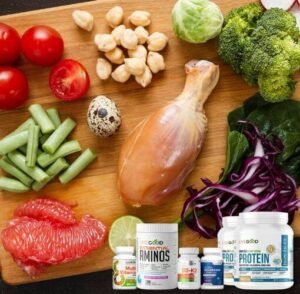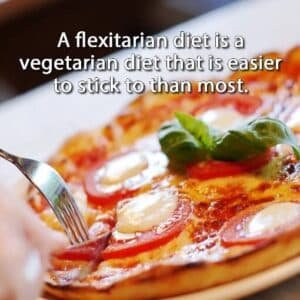Introduction to the Flexitarian Diet: The Balanced Blend of Veggie and Non-Veggie Worlds

Navigating the intersection of vegetarian and non-vegetarian dietary paths, the flexitarian diet emerges as one amount many solutions for weight-loss seekers and health enthusiasts alike. It’s a unique fusion of ‘flexible’ and ‘vegetarian,’ signifying its versatile nature.
This dynamic dietary approach spotlights plant-based meals while also permitting occasional indulgences in meat and animal products. Ingeniously designed for those not quite ready to sever all ties with their meat-eating tendencies, the Flexitarian diet redefines healthy eating. It not only positions plant-rich nutrition at its core but also adds a tasteful twist of variety, making it an appealing option for a balanced, nutritious diet.
Advantages of a Flexitarian Diet for a Healthy Lifestyle and Weight Loss
In the world of diets, the flexitarian plan stands out, acting as the perfect ally for individuals seeking weight loss and improved health. Given that the diet rests on nutrient-dense plant foods, adopting this plan translates to embracing a healthy lifestyle. The objective here is simple yet transformative – increase the intake of plant foods in your daily meals while slowly cutting back on meat and animal products.
The Three Levels of Flexitarianism: The Journey from Beginner to Expert
What sets the flexitarian diet apart is its multi-tiered nature – beginner, advanced, and expert – each reflecting a gradual increase in plant-based food intake.
For beginners, the flexitarian journey starts with two meatless days every week, substituting with protein-rich alternatives like legumes or tofu. When they reach the advanced stage, meatless days rise to 3-4 per week. The experts, committed to the core, revel in plant-rich diets for five or more days per week.
Harnessing Plant-Based Power for Weight Loss
 The linchpin of the Flexitarian diet for weight loss is the nutritive abundance and low-calorie profile of plant-based foods. Lower amounts of saturated fats and cholesterol, combined with an influx of vitamins, minerals, and fiber, make a healthful blend that naturally fuels weight loss. Along with this, the Lean Body Pack is an efficient way to enhance this weight loss journey. Packed with scientifically backed ingredients, this supplement boosts metabolism and curbs hunger, thus helping you maintain a calorie deficit. So, while the Flexitarian diet furnishes you with vital nutrients, the Lean Body Pack aids in optimizing the fat-burning process, thereby enhancing your overall weight loss results.
The linchpin of the Flexitarian diet for weight loss is the nutritive abundance and low-calorie profile of plant-based foods. Lower amounts of saturated fats and cholesterol, combined with an influx of vitamins, minerals, and fiber, make a healthful blend that naturally fuels weight loss. Along with this, the Lean Body Pack is an efficient way to enhance this weight loss journey. Packed with scientifically backed ingredients, this supplement boosts metabolism and curbs hunger, thus helping you maintain a calorie deficit. So, while the Flexitarian diet furnishes you with vital nutrients, the Lean Body Pack aids in optimizing the fat-burning process, thereby enhancing your overall weight loss results.
The Role of Processed Foods in Health and Weight Management
Flexitarianism doesn’t stop at endorsing plant-based foods; it also highlights the importance of sidelining processed foods. Cutting back on processed food, often laden with unhealthy fats, sodium, and sugar, can significantly contribute to mitigating a multitude of health conditions. While this principle bolsters weight loss, portion control remains a crucial factor. To top off your nutritional needs and maintain better health, consider adding the Bio-Active Complete Multi-Vitamin to your routine. This comprehensive supplement ensures you’re not missing out on any essential nutrients.
Tips for Successfully Incorporating Exercise with the Flexitarian Diet
To make the most of the flexitarian diet for weight loss, don’t forget to tag team it with regular physical activity.
As your diet starts to lean towards healthier foods, you’ll likely experience reduced cravings for unhealthy, processed foods, thus making exercise feel less like a chore and more like a natural part of your daily routine. With a well-balanced diet full of fresh produce, lean proteins, and wholesome grains, you’re fueling your body with the necessary energy to get moving. Pair this with the Lean Body Pack, and you have a holistic approach to weight loss that covers all bases – diet, exercise, and supplementation.
The Caloric Math: How Flexitarianism Aids in Weight Loss
A typical diet could involve around 2000 calories per day, but the Flexitarian diet treads on a different path with an approximate intake of 1500 calories per day. These are not just any calories, but nutrient-packed calories, paving the way for weight loss without sacrificing nutrition.
Essentially, you’ll consume fewer calories, but each calorie is more nutritionally valuable, thus offering a double advantage.
The Protein Conundrum: Alternatives to Meat
For those worried about protein intake while reducing meat, the Flexitarian diet offers a banquet of alternatives. From legumes to seeds and nuts, there’s an array of foods high in protein and brimming with other essential nutrients like iron and folate.
Additionally, LiveGood’s Complete Plant-Based Protein supplement can be a valuable addition to your daily routine. Specially designed to meet your protein needs, it can be seamlessly integrated into a variety of meals, providing you with a hassle-free protein boost.
Grain Gain: The Importance of Whole Grains in a Flexitarian Diet
 Venturing into the realm of the flexitarian diet for weight loss means inviting the wholesome benefits of whole grains into your dietary regime.
Venturing into the realm of the flexitarian diet for weight loss means inviting the wholesome benefits of whole grains into your dietary regime.
Foods such as brown rice, quinoa, and whole-grain pasta play an integral part in this diet. Not only do they satiate your hunger longer compared to their processed white counterparts, but they also successfully curb those stubborn starchy cravings. Their high fiber content aids digestion and helps maintain a feeling of fullness, serving as your ally in keeping unhealthy snacking at bay.
Beyond just being a diet, the flexitarian lifestyle urges you to connect with nutrition at a deeper level. It doesn’t merely guide your weight loss journey but also aligns you with healthier eating habits for sustained wellness.
Flexitarian Recipes: Taste the Freedom of Choice and Creativity
The flexitarian vegan approach isn’t simply a set of dietary rules; it’s an invitation to delve into a universe of gastronomic ingenuity. With a myriad of recipes readily available and the autonomy to craft your own, using chiefly plant-based components, you can ensure your meals are as vibrant in taste as they are healthful. Starting off with merely 3-4 days of meat-free meals a week and progressively transitioning to just 1-2 days of meat-inclusive meals is a feasible strategy that doesn’t feel constricting. Interestingly, this dietary style might offer more freedom than stricter vegetarian or vegan diets, making it easier to adhere to for sustained periods.


0 Comments